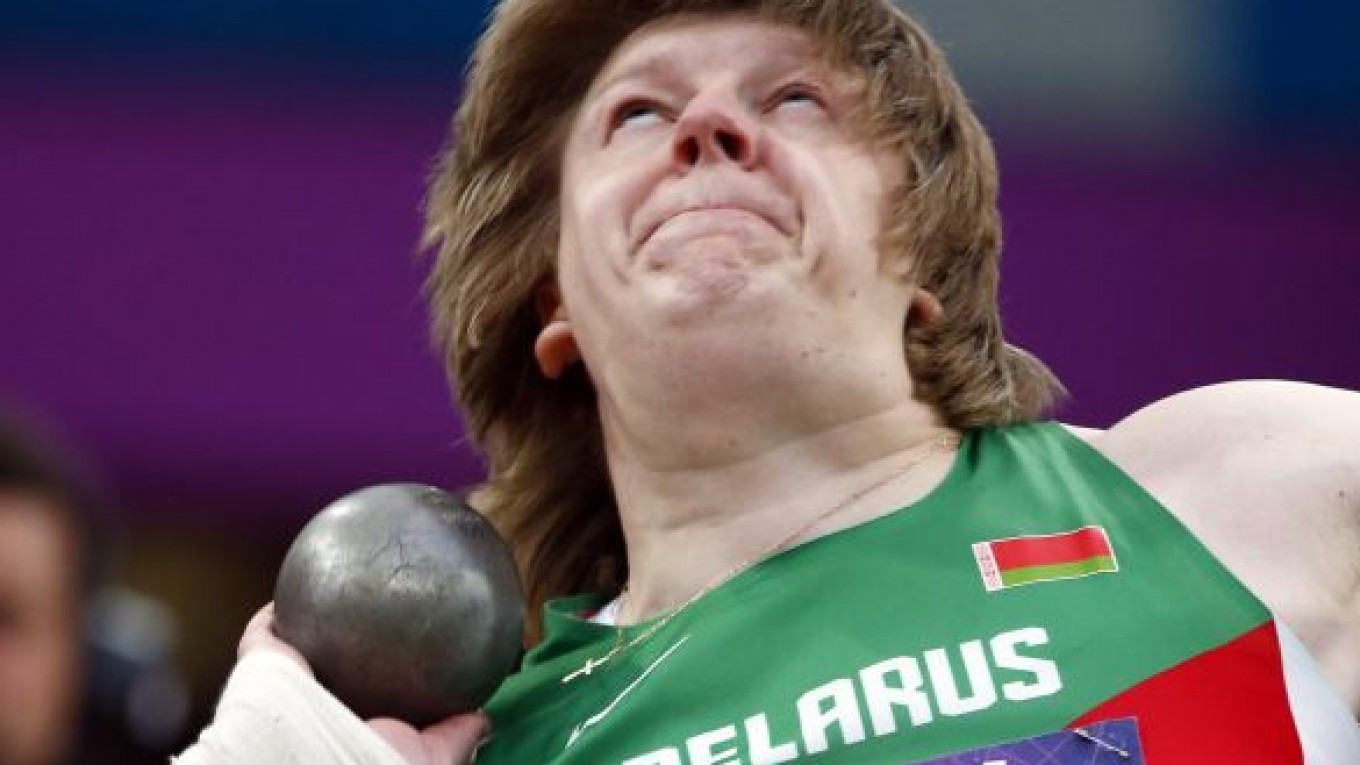LONDON — Shot putter Nadzeya Ostapchuk of Belarus became the first athlete to be stripped of a medal at the London Olympics after her gold was withdrawn Monday for doping.
Valerie Adams of New Zealand was awarded the gold, and Yevgenia Kolodko of Russia was bumped up to silver. Fourth-place finisher Gong Lijiao of China was moved up to bronze.
The International Olympic Committee said Ostapchuk tested positive for the steroid metenolone. She won the shot put exactly a week earlier. The IOC said she was tested the day before her competition and again following the event. Both samples were positive.
"The [Olympic committee] of Belarus is ordered to return to the IOC, as soon as possible, the medal, diploma and medallist pin awarded to the athlete in relation to the above-noted event," the IOC said in a statement.
The announcement came hours after the flame was extinguished at the closing ceremony with athletes and officials heading out of London. A day earlier, IOC President Jacques Rogge had proclaimed the fight against doping a success.
The Belarussian team had already sent home hammer thrower Ivan Tsikhan because of suspicions over a sample provided after his silver-medal performance at the 2004 Athens Games.
Besides Ostapchuk, only one athlete tested positive for a banned substance after competing. U.S. judo fighter Nick Delpopolo was cited for traces of marijuana in his urine sample.
He blamed "inadvertent consumption" of food baked with the substance. The IOC disqualified him from seventh place in the 73-kilogram class.
Seven more were caught in doping controls conducted since the official testing period for the games began July 16. One of the seven competed in London before her test result was known.
"I think that is a sign that the system works," Rogge said Sunday. "I am happy about the fact that we could catch athletes who cheated, both before the games and at the games."
The IOC had said this would be its most extensive Olympic anti-doping program. It took almost 6,000 urine and blood samples, including no-notice tests ahead of athletes competing.
Rogge cautioned that some samples are still being analyzed and "we might hear something tomorrow or the day after. Hopefully not, but you never know."
Syrian runner Ghfran Almouhamad tested positive for the stimulant methylhexaneamine two days before her 400-meter hurdles heat. She placed eighth and was eliminated before the IOC disqualified her.
Until this latest turn of events, the London Games were set to end with medal standings in all 302 events unaltered by doping scandals.
Three Beijing events were tainted during the games, and two more medals were changed months later when a new test for the blood-booster CERA was introduced. The signature men's 1,500-meter gold medal was stripped from Rashid Ramzi of Bahrain.
Rogge reminded that the IOC will store all samples from London and can reanalyze them, revise results and reallocate medals until the statute of limitations expires in August 2020.
"When there are no new tests, we wait until the last moment; if there is a breakthrough new test, we'll test immediately," he said.
Indeed, the next Olympic doping scandal could be from the 2004 Athens Games instead. Next week the IOC could announce up to five new disciplinary cases based on retested samples.
A Message from The Moscow Times:
Dear readers,
We are facing unprecedented challenges. Russia's Prosecutor General's Office has designated The Moscow Times as an "undesirable" organization, criminalizing our work and putting our staff at risk of prosecution. This follows our earlier unjust labeling as a "foreign agent."
These actions are direct attempts to silence independent journalism in Russia. The authorities claim our work "discredits the decisions of the Russian leadership." We see things differently: we strive to provide accurate, unbiased reporting on Russia.
We, the journalists of The Moscow Times, refuse to be silenced. But to continue our work, we need your help.
Your support, no matter how small, makes a world of difference. If you can, please support us monthly starting from just $2. It's quick to set up, and every contribution makes a significant impact.
By supporting The Moscow Times, you're defending open, independent journalism in the face of repression. Thank you for standing with us.
Remind me later.






